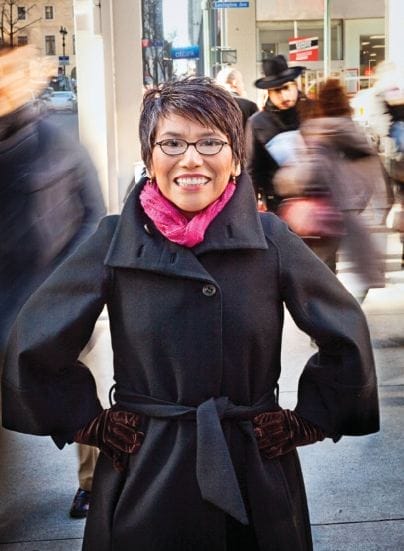The professional journey of Rosanna Ramos-Velita, G’92, WG’92, took her from Peru to North Dakota as a Fulbright Institute of International Education scholar, from being an engineer at AT&T in Allentown, PA, to attending Wharton, from investment banking jobs to a senior CFO role at Citigroup. Only now, though, does she see herself as truly having an impact. As chairman of the board at Caja Rural Los Andes, a microfinance bank serving rural entrepreneurs in Andean Peru—as well as boardmember at the Grameen Foundation—she makes her own dent in poverty. She also serves on the Wharton Executive Board for Latin America, where she hopes to open up the School to opportunities throughout Central and South America.
WHARTON MAGAZINE: How has your Wharton knowledge empowered you to have a relevant impact upon the world?
ROSANNA RAMOS-VELITA: I think Wharton prepares you for the best, most challenging jobs. So I think I really honed my skills. I learned a lot. And also the Lauder program—the part of understanding different cultures, understanding the sensitivities of how you do business in other parts of the world—it’s very much a part of who I am as a business person.
WM: How else has your Wharton experience assisted you?
RAMOS-VELITA: My first business I started with Dina Weitzman, G’92,WG’92, and now in Los Andes, one of my partners is Radhika Shroff, C’95, W’95, G’00, WG’00. Both of them are Wharton and Lauder, and some of my investors are some of my classmates as well. I think it speaks about the powerful network and the relationships you develop because these guys have known me now for 20 years, so they’ve seen my development. They’ve seen how I have worked hard to do this.
WM: Why microfinance?
RAMOS-VELITA: I became a senior CFO at Citigroup, and that allowed me to see some of the microfinance groups at play. And at the time, I saw one client that was taking a consumer finance loan, but instead of using it for consumption, she put it in her little taqueria business. When I told her that I worked for the institution that gave her that loan, she hugged me, embraced me and thanked me.
I had never had an investment-banking client who was so thankful to me, and she told me her journey, which was that she was selling tacos door to door, and she saw this branch where loans were being offered, and she applied for one and she got one. Interest rates were very high. But she made her math in her head, and she calculated that not only could she pay the loan but also really double the size of her business.
That was my “a-ha moment.” I decided that I needed to find a way where I could really bring all the expertise that I have gathered, all the knowledge, all the capital management that I know, and bring it to Peru, and try to find my niche on applying banking expertise but also making a difference.
WM: What products does Caja Rural Los Andes offer now?
RAMOS-VELITA: Microdeposits, insurance—microinsurance particularly—and working capital loans.
WM: What are some of your hobbies and pursuits outside of work?
RAMOS-VELITA: Oh, I love tennis. I like to work out. I like to go running. I like to go hiking. I read. I try to look for biographies of women, of strong women who can be my role models.
WM: What are you reading right now?
RAMOS-VELITA: I’m reading Catherine the Great, her biography, which is really amazing. I could see the traits of being a strong woman in her.
WM: What are some?
RAMOS-VELITA: Persistence. Perseverance. Awareness of herself. Having a great education also. She educated herself very well, spoke several languages. Adapted to a new culture because she was actually German, but embraced Russian culture. Learned Russian perfectly, and the Russian people felt she was theirs.
WM: You have a B.S. in engineering, two master’s (one from Lauder, one in electrical engineering from Lehigh) and your MBA. Why the focus on education?
RAMOS-VELITA: I saw my parents really teach us the value of entrepreneurship and academic achievement. My mother is a chemist, and in a small city in Peru, she started her first pharmacy. I saw her serving her clients who were very poor villagers from remote communities. They would come to this area of town and buy medicines and other supplies and go back to the villages and sell them. And my father was a psychiatrist, but he also came from a tiny fisherman’s village in Peru. This is the ’50s, but he was very smart and worked very hard, and one scholarship after another, he ended up at a top medical school.
WM: If there is one thing about you now that Wharton classmates might not know about?
RAMOS-VELITA: I think probably they don’t know that I now have more patience than when I was 27 or 28.


























